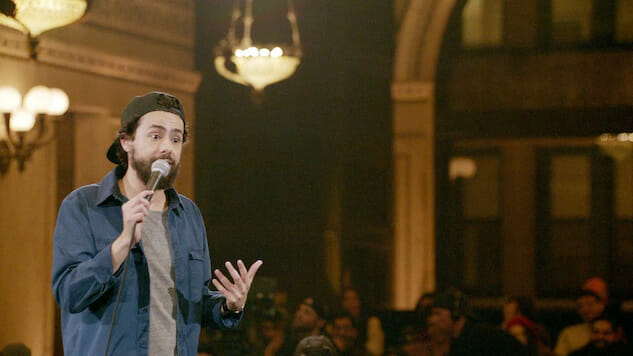Ramy Youssef Gets You All Up in His Feelings
Photo via HBO
There’s something special about art that doesn’t fully make sense until you’ve consumed the whole thing. Ramy Youssef, hot on the heels of his incredible autobiographical Hulu series Ramy, has now released Feelings, his first stand-up special on HBO. And it would be understandable if, based on the first ten minutes, you were confused.
Youssef has built a following with his thoughtful, yet hilarious, examinations of life as an American millennial Muslim. Which is why it may come as a surprise when he opens Feelings with topical jokes that may at first feel three minutes away from being too old to tell. Jussie Smollett, Michael Jackson (okay, Michael Jackson jokes are proving timeless), R. Kelly: the subjects read like a list of topics you wish were banned by open mics.
These topics may have a timer when it comes to our attention span, but that doesn’t mean they aren’t culturally symbolic. What are the unintended outcomes of cultural trauma? What would trusting your kid with a stranger take? Carving gold from these stripped mines takes a gifted writer, and thankfully Youssef is more than up to the task. But what surprised me on repeated viewings of Feelings is how much these jokes inform the special as an entire piece.
Smollett, a gay black man, becomes a symbol of how growing up in a society that hates your existence influences you. People have been making Michael Jackson jokes forever, but why wouldn’t millennials have a take on him? Youssef was 18 when Jackson died, and witnessed the same culture that shamed Jackson mourn his death like royalty. As someone born in 1991, Youssef was part of the generation of kids who sang “I Believe I Can Fly” like a hymn in schools. What viewers, and critics, might immediately write off as quickly expiring subject matter is a window into how our past informs our present. And in one case, it’s a set up to the darkest closing joke in modern HBO stand-up history.
Feelings is an incredibly low-key affair. Filmed at the Chicago Cultural Center instead of a traditional theater or club, it lacks the sound of bombastic laughter found in most specials. Even the biggest laughs often get muted by the tall ceilings of the beautiful room. But rather than hinder the show, they leave the focus on Youssef as he bounds from topics that are seemingly trivial to deeply personal examinations of his life as an American Mulsim.
No other special in stand-up history has been so equally horny and spiritual, often at the same time. He’s constantly thinking about sex like most 20-somethings, often even as he’s tied to God. When a woman finds his continued attendance at Friday prayers after the Mosque shooting in New Zealand hot, Yousseff finds a newfound confidence. In the same spirit, his parent’s lack of sexual education training leaves him terrified of the consequences of unprotected sex.
-

-

-

-

-

-

-

-

-

-

-

-

-

-

-

-

-

-

-

-

-

-

-

-

-

-

-

-

-

-

-

-

-

-

-

-

-

-

-

-








































